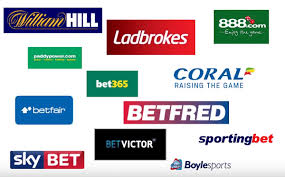Paddy Power Betfair and 888 are among the big winners after the U.S. Supreme Court ruled in favor of abolishing the Professional and Amateur Sports Protection Act of 1992 (PASPA). The U.K. bookmakers’ combined value rose by more than €1.5 million after the decision was announced.
The act, which had stood for 26 years, had made sports betting illegal in all states with the exception of Nevada, Oregon, Montana, and Delaware. After a vote of 7 to 2, the Supreme Court justices struck down the nationwide ban.
The ruling is a starting gun in the race between online gambling companies and British top bookmakers in a bid to win the lucrative U.S. market. Each state is now free to draw up its own laws to allow sport betting.

888 among the top gainers
 Immediately after the decision, shares of 888 rose by 15 percent, which was more than any other company in the United States.
Immediately after the decision, shares of 888 rose by 15 percent, which was more than any other company in the United States.
According to Itai Frieberger, the firm’s chief executive, the firm is well-positioned in anticipation of the exploits and potential growth opportunities that are imminent after the U.S. market was rendered open for betting firms.
Other gainers include Paddy Power Betfair and William Hill, both of which have sizable footholds in the States. Early on, the firms had begun taking swift measures in anticipation of a favorable decision. As a result, William Hill and Paddy Power Betfair enjoyed a 10.7 percent and 12.2 percent gain, respectively.
On the other hand is GVC Holdings, which had earlier in the year sealed a merger with Ladbroke worth $4 billion. The firm, which has a lesser presence in the States, upped its value in the U.S. with a modest 7.6 percent.
Playtech, another gambling software company’s value rose by 3 percent.
The combined share prices inflated the value of the London-listed gambling firms by at least €1.5 billion.
Good news after good news
 The news comes as traditional bookmakers, such as William Hill, are recovering from losses at the onset of the decision to cut maximum stakes on FOBT to €2 from €100. The decision is expected to account for at least half the bookmaker’s revenue.
The news comes as traditional bookmakers, such as William Hill, are recovering from losses at the onset of the decision to cut maximum stakes on FOBT to €2 from €100. The decision is expected to account for at least half the bookmaker’s revenue.
Phillip Bowcock, the chief executive at William Hill, called the FOBT rule a “landmark moment for sports betting,” and the company is now shifting its attention across the pond.
Bowcock acknowledged his company had already begun taking steps in case the Supreme Court invalidated the law. He added the legalization of sports betting means that sports leagues and consumers now had greater protection. The United States would benefit from the taxes and job creation as well.
Bowcock confirmed that New Jersey would be the state where the company will start its operations. He also admitted plans were underway for more states to join in and he would update that information, as soon as it was confirmed.
Geoff Freeman, American Gaming Association president, said the decision is “a victory for millions of punters in the United States looking for a safe betting environment in a regulated manner.”
Freeman also argued the now-abolished law had given rise to an illegal gambling industry worth more than $150 billion.
Some critics argue the ruling now encourages the corruption of professional and college sports, in addition to its adverse effects on the young.
But, on the other hand, the ruling will now critically weaken illegal betting operations and effectively abate organized crime, as well as produce more revenue for individual states and more jobs.
Regulation by individual states
The ball now lies in the courts of the individual states, which will decide how tightly they want to regulate the industry. Some are expected to restrict it to land-based casinos and race tracks as opposed to online bet permits. Others will propose workable tax rates.
All in all, analysts say it could take years before we see wide-scale sports betting in the U.S.
Disclaimer: All images are copyright to their respective owners and are used by USA Online Casino for informational purposes only.












